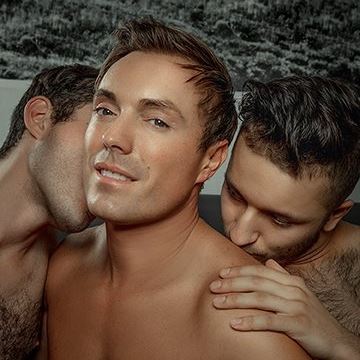Interview: At Regional Premiere By Utah Rep, Playwright S. Asher Gelman Says The Runaway Hit AFTERGLOW Is 'About Love, Loyalty And Trust'
.jpg) AFTERGLOW opened at off-Broadway's Davenport Theater on June, 23, 2017 for an eight-week run. And then was extended. And extended. And extended... And then closed 14 months later, on Aug. 12, 2018.
AFTERGLOW opened at off-Broadway's Davenport Theater on June, 23, 2017 for an eight-week run. And then was extended. And extended. And extended... And then closed 14 months later, on Aug. 12, 2018.
And Pride called the play "necessary in the modern era."
It appears the Rocky Mountain regional premiere production will enjoy similar success. One week before opening, the staging by the innovative Utah Repertory Theater Company is 60 percent sold out.
 After learning of the off-Broadway sensation, I greatly looked forward to my interview with AFTERGLOW playwright S. Asher Gelman. (AND I'm happy that before it was sold out, I was able to purchase my ticket to opening night, when Gelman will be in Salt Lake City, at Utah Rep's invitation.)
After learning of the off-Broadway sensation, I greatly looked forward to my interview with AFTERGLOW playwright S. Asher Gelman. (AND I'm happy that before it was sold out, I was able to purchase my ticket to opening night, when Gelman will be in Salt Lake City, at Utah Rep's invitation.)
You've said the concept of AFTERGLOW came after you and your husband had an experience with an open relationship.
S. Asher Gelman: My husband and I have been together for 10 years; open for the past five. The events that inspired AFTERGLOW occurred shortly after we opened our relationship. That was the most difficult chapter in our marriage, but turning that experience into art and, by extension such a positive experience, has been spectacularly cathartic.
Ultimately, the show, at least to me, is about honesty and what happens when you lose it. My marriage works because my husband and I are always honest with each other; we don't shy away from difficult conversations for fear that we can't handle the truth.
I'd love for people who experience AFTERGLOW to feel empowered to have those difficult conversations -- with their partners, with their friends, with their family -- because I firmly believe that transparency is the basis of any good relationship. Several audience members reached out to us because they ended unhealthy and unfulfilling relationships after seeing the show, and I take that as the highest of compliments.
What was your initial reaction when you learned AFTERGLOW would receive its first post-NYC production in the Vatican of Mormonism, SLC?
I know too much about Salt Lake City to be terribly surprised by its production there. I will say that a dear friend of mine, Allison, whom I used to dance with in Tel Aviv, lives there. When she flew out to New York in March to see AFTERGLOW, she mentioned that I should come visit her in Salt Lake City. I joked, "Maybe when AFTERGLOW gets produced there." When I heard this production was happening, I called her immediately, opening with, "Allison, are you sitting down?"
The three men in AFTERGLOW are gay. Have you seen similar situations in straight relationships? Can theatergoers identify with at least aspects of Josh, Alex and Darius?
Nowhere is it written that the three men in AFTERGLOW are gay. They are men who have sex with men, but I've explicitly avoided any mention of sexual orientation. This is not a gay play, nor was it ever intended to be (though most of its audience does fit that demographic). It's a story about three human beings trying to navigate complex emotional, physical and intellectual connections, and that is a universal experience.
Nudity and depictions of sexual situations are included because...
Nudity and sexual situations are a fundamental part of the human experience. AFTERGLOW, at its heart, is a play about love, loyalty and trust -- and how those three concepts carry different meanings for each individual. It discusses these issues in raw, unapologetic and, at times, even abrasive ways within the framework of a culture that constantly teases sex and sexuality, but is, simultaneously, paralyzingly embarrassed by it.
Sex, lust, and love are powerful themes in the play, used as a device to advance the plot. To tackle such issues while shying away from nudity, for fear that it would embarrass either its audience or its performers, would be disingenuous to the world and message of the piece.
Anything you'd like to add?
My next play, SAFEWORD, is an exploration of power dynamics through BDSM and food. It opens off-Broadway in April. I hope to see its production in Salt Lake City as well.
Did you read that, Utah Rep producers?
Videos
